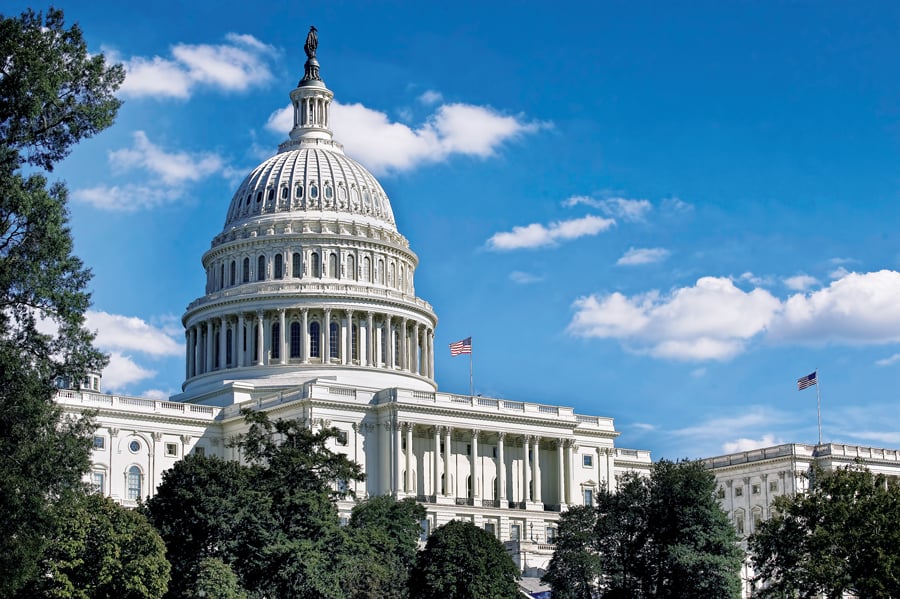

Congressional rejection of the Department of Labor ESG rule for retirement accounts won’t kill the rule but it could introduce new uncertainty for plan advisors.
On Thursday, the Senate approved a resolution, 50-46, to rescind the regulation. All the chamber’s Republicans voted in favor of the legislation, along with two Democrats. The House approved the resolution earlier in the week, 216-204, on a nearly party-line vote.
The resolution now heads to President Biden, who will veto it. Biden’s move will preserve the regulation, which allows retirement plan fiduciaries to consider environmental, social and governance factors in selecting investments. It replaces a Trump DOL rule that critics said chilled the use of ESG in retirement savings.
Republicans and a few Democrats opposed the rule because they asserted that it elevated social policy goals above investment returns. The fact that Congress is on record supporting a resolution to take the rule off the books could be brought up in lawsuits against the rule.
The congressional backing of the resolution also could have a chilling effect on ESG retirement investing, experts said.
“It’s done nothing but add confusion for investors and financial advisors that serve them,” said Zach Conway, co-founder and CEO of Seeds Investor, a software platform that helps advisors with investment strategies.
Although the margins in the House and Senate were razor-thin, the congressional vote shows that policy related to ESG investing can change with the political winds based on election outcomes every two or four years.
That’s not helpful for retirement plan fiduciaries who think in terms of 30 years for investments, said Ethan Powell, founder of Impact Shares, a nonprofit ETF platform that builds ESG strategies.
“That uncertainty is going to drive the lack of broader adoption [of ESG] in the United States,” Powell said. “The reason is the mismatch of the [investing and political] timelines.”
One of the Republican authors of the resolution said he and his allies were trying to bolster retirement accounts by focusing investment decisions on returns.
“My message to the White House is simple: Keep your hands off Hoosiers’ 401(k)s,” Sen. Mike Braun, R-Ind., said in a statement, using the nickname for citizens of his state. “President Biden is putting Hoosiers’ retirement savings at risk by changing the rules to allow money managers to invest based on progressive political goals rather than on the best rate of return. President Biden will now receive a searing, bipartisan rebuke of his policy that’s going to hurt Americans’ retirement savings.”
But following Biden's veto, the fight over ESG will return to political stasis. Political power on Capitol Hill is split between a Republican House and a Democratic Senate, with both parties holding narrow margins.
That means that legislation codifying the DOL ESG rule, as well as bills to overturn it, won’t go anywhere. Under the Congressional Review Act, this week’s resolution avoided a Senate filibuster. Other bills would have to obtain a 60-vote majority.
“It would take an act of Congress to change the rule,” said Bryan McGannon, managing director at U.S. SIF The Forum for Sustainable and Responsible Investment. “Congress doesn’t have the votes to do that one way or the other.”
Advocates for ESG assert that opponents of the DOL regulation mischaracterize it as forcing retirement advisors to evaluate investments through an ESG lens.
“The DOL rule returns the process to neutrality,” said Steven Rothstein, managing director of the Ceres Accelerator for Sustainable Capital Markets. “It’s not a mandate of any kind. It gives employers and employees an opportunity to consider a full range of risks and opportunities in their portfolios, including climate. That’s not a political judgment. That’s a sound fiduciary responsibility.”
Powell said that no plan fiduciary has to take ESG consideration into account under the DOL rule. But proponents of the resolution want to take that option out of their hands, he said.
“They’re creating the type of optical damage to ESG they intended to create,” Powell said.
Conway said the controversy over ESG arises because a wide range of investment risk considerations are condensed into the disputed acronym. The latest political dust-up may lead to more clarity, he said.
“What will continue to happen is a shift in semantics,” Conway said. “The silver lining is that managers will be clearer in how they’re using the data to determine how they invest in companies and build portfolios.”

Wealth managers highlight strategies for clients trying to retire before 65 without running out of money.

Shares of the online brokerage jumped as it reported a surge in trading, counting crypto transactions, though analysts remained largely unmoved.

President meets with ‘highly overrated globalist’ at the White House.

A new proposal could end the ban on promoting client reviews in states like California and Connecticut, giving state-registered advisors a level playing field with their SEC-registered peers.

Morningstar research data show improved retirement trajectories for self-directors and allocators placed in managed accounts.
Orion's Tom Wilson on delivering coordinated, high-touch service in a world where returns alone no longer set you apart.
Barely a decade old, registered index-linked annuities have quickly surged in popularity, thanks to their unique blend of protection and growth potential—an appealing option for investors looking to chart a steadier course through today's choppy market waters, says Myles Lambert, Brighthouse Financial.
